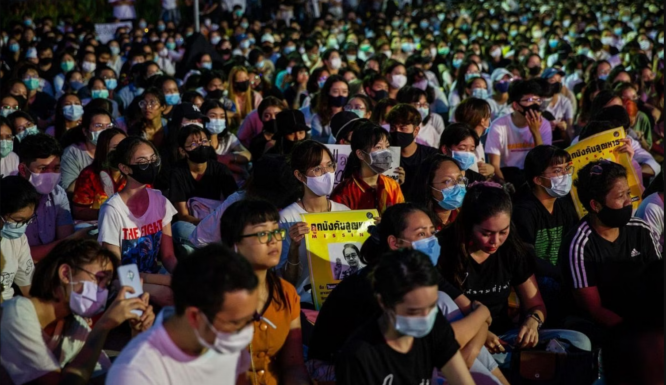Three years after Thailand’s big youth-led pro-democracy demonstrations shattered taboos by publicly discussing the country’s strong monarchy, the topic is now part of the societal conversation and party advertising for next weekend’s general election.
For the first time in Thailand’s recent history, parties, candidates, television programs, and citizens are openly debating reform of the country’s strict lèse majesté law and, to a lesser extent, the royal institution and various aspects of government as citizens prepare to vote in the May 14 polls, which have never had such a wide political spectrum.
Royal reforms have shifted from street outcry to national politics.
“Every single television channel, every news reporter, every academic, every political party, every single individual now feels that it’s possible to talk about the monarchy or monarchical reform,” says Bangkok’s Chulalongkorn University political scientist Kanokrat Lertchoosakul to EFE.
Thailand has a long history of coups and regularly enforces one of the world’s strictest lèse majesté laws, Article 112 of the penal code, which punishes defamation or insult of royal family members with three to 15 years in prison. Kanokrat calls this a “new normal” for public discussion of these issues.
She believes that even conservatives, who are not thrilled about this, are now confronting the new reality that this topic has become a discussion and they are in the argument too, to safeguard their own stances.
The problem affects all political parties, from the progressive Move Forward, one of the polls’ favorites, to the royalist Thai Pakdee, founded in 2021 to support the monarch and resist the protests.

The opposition Pheu Thai, led by Paetongtarn Shinawatra, daughter of exiled former leader Thaksin Shinawatra, and Prime Minister Prayut Chan-ocha’s pro-monarchy United Thai Nation Party are in the middle.
Kanokrat considers these elections a turning point in Thailand’s history
According to the NGO Thai Lawyers for Human Rights, 242 persons have been charged under the lèse-majesté law since July 2020, and approximately 2,000 have been accused and/or punished for political activity and expression.
During the election campaign, the political elite was divided on Article 112’s softening, toughening, or abolition.
“In the past, all television channels and journalists would be sued if they had this kind of question in electoral debates. “But now this has become the new normal in Thai politics and we have seen this clearly in this election,” Kanokrat adds.
Although the student movement opened the door for monarchy discussion, Chulalongkorn University political scientist Pitch Pongsawat says that its “reform is not the central issue, even though people know it is on the agenda,” which is more focused on military reform, marriage equality, and structural change.
“It’s changing, but it won’t be an earthquake. He claims everyone has adjusted.
“Many people aren’t aware that it remains prohibited to talk in public and they might get in trouble and face consequences,” says Ubon Ratchathani University Faculty of Political Science Dean Titipol Phakdeewanich.
Despite slight changes in recent years, the monarchy remains a “very sensitive” topic in Thailand, and censorship still exists in many sectors, according to the three experts. EFE

